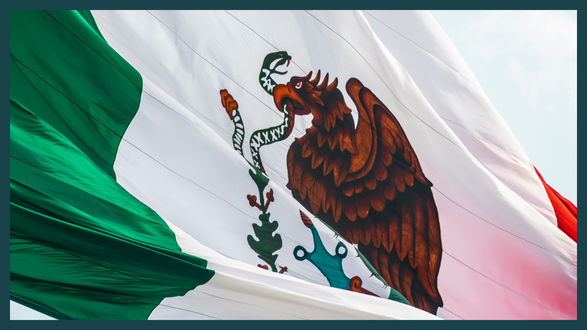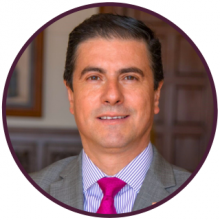Webinar
Mexico's 2024 Election
On June 2, nearly 100 million Mexican citizens are expected to vote in their country’s national election, in which the leading candidates are former Mexico City mayor, Claudia Sheinbaum, of the ruling Morena party, and Xóchitl Gálvez, a former Senator and businesswoman who leads a coalition of center right and center left parties. 2024 marks the first time in Mexican history that both leading candidates are women ensuring that Mexico will elect its first female President.
Major issues facing the candidates include escalating cartel violence, the economy, corruption, and reforms to the political and judicial systems. Incumbent President Andrés Manuel López Obrador remains highly popular, but is unable to run for reelection due to term limits.
The election results are highly consequential for the United States due to the deep economic, political and social ties between the countries. With a U.S. Presidential election later this year, policy conversations around migration, illegal trafficking, and economic partnerships may shift significantly.
Our distinguished speakers will discuss the results and implications of the election for both Mexico and the United States. Guests will also have the opportunity to participate in a Q&A.
As a primer, we have two informative pieces written by our moderator, Duncan Wood, PhD, on the importance of Mexico's 2024 presidential election: Global look: Elections in Mexico, Global Impact (via El Universal) and Why Congress Should Pay Attention to Mexico’s Presidential Election (via National Interest).
Watch the recording on the Pacific Council YouTube channel.
Guest Speaker
Dr. Cecilia Farfán-Méndez is a Researcher with the Institute on Global Conflict and Cooperation at UC San Diego and the Center for Studies on Security, Intelligence, and Governance (CESIG) at the Instituto Tecnológico Autónomo de México (ITAM). Dr. Farfán is an expert on organized crime, U.S.-Mexico security cooperation, and gender mainstreaming. Her work focuses on understanding the business models of criminal groups. Notable collaborations include Mapping Criminal Organizations in Mexico, the first public and free-access database tracking the presence and chronology of criminal groups in Mexico, the Mexico Opium Project that examined regional differences of opium poppy cultivation, and The Battles after the Battle: Interpreting Violence and Memory in Culiacán, shortlisted for the Breach-Valdez Journalism Prize for Journalism and Human Rights.
Dr. Farfán has consulted for the United Nations Office on Drugs and Crime, the Organization of American States; the United States Institute for Peace and USAID. Dr. Farfán regularly guest lectures at the U.S. Foreign Service Institute, is a member of the Global Initiative Against Transnational Organized Crime, the Urban Violence Research Network, and the strategy committee for the Journal of Illicit Economies and Development.
Dr. Farfán received her doctorate in political science from UC Santa Barbara, her master’s degree in international affairs from Columbia University’s School of International and Public Affairs, and her bachelor’s in international relations from the Instituto Tecnológico Autónomo de México (ITAM). She has been a recipient of several research fellowships including the Fulbright Program and Mexico’s National Council on Science and Technology.
Guest Speaker
Ambassador Geronimo Gutierrez is a senior advisor at Covington and Burling in Washington D.C., a managing partner of BEEL Infrastructure, a specialized advisory and asset management firm focused on the infrastructure sector in Latin America, and an independent board member of Seguros Monterrey New York Life. He also serves on advisory boards of the United States – Mexico Business Association (AEM), the Woodrow Wilson Center’s Mexico Institute and the American Society of Mexico.
Throughout a 20-year career in senior government positions, he served under five Mexican presidents in the areas of finance, trade, national security and diplomacy. During his last position as Mexico’s Ambassador to the United States (2017-2018), he was deeply involved in the negotiations of the United States of America, Mexico and Canada Agreement (USMCA).
Previously he served as Managing Director of the North American Development Bank (NADB), Deputy Secretary for Governance and Homeland Security and member of the National Security Council’s Executive Committee and, in the Foreign Ministry, as Under Secretary for Latin America and the Caribbean and Under Secretary for North America. In the latter capacity, he coordinated day-to-day trilateral and bilateral affairs with the United States and Canada. He also led negotiations for the creation of the Security and Prosperity Partnership for North America (SPP) –prelude to the present day North American Leaders Summit.
Gerónimo holds a B.A. degree in Economics from the Instituto Tecnológico Autónomo de México (ITAM) and a master’s degree in public administration from Harvard’s John F. Kennedy School of Government, for which he received a Fulbright-García Robles Scholarship.
He regularly contributes with opinion articles for newspapers and magazines in Mexico and the United States and teaches a course on Contemporary Issues of U.S – Mexico Relations at George Washington University. Geronimo lives in Washington D.C. and regularly spends time in Mexico and Texas.
Moderator
Duncan Wood, PhD, has worked in the areas of international relations and policy. He is an internationally renowned specialist on the geopolitics of energy, supply chain policy, critical minerals, Mexican politics and US-Mexican ties. He has frequently given testimony to the U.S. Congress, is a widely quoted media source, and has published extensively on a wide range of global issues. He is the author or editor of 12 books and more than 30 chapters and articles.
Born in Kent, England, he studied politics at Leicester University before pursuing graduate studies in political science at McMaster University and Queens University, both in Ontario, Canada. In 1996 he received his PhD and moved to Mexico City, to work at the Instituto Tecnologico Autonomo de Mexico, where he became a professor of and director of the program in International Relations. After 17 years in Mexico, working on international banking supervision, energy policy and North American integration, he became the Director of the Mexico Institute at the Wilson Center in Washington, D.C. In 2021, Dr Wood was promoted to the role of Vice President for Strategy and New Initiatives at the Wilson Center and worked alongside the Board of Trustees to design a new strategic plan for the center.
Over the past decade he has served as co-chair of the World Economic Forum’s Global Future Council on Transparency and Anti-Corruption and has worked closely with the WEF on energy policy. He is a board member of Transparency International, Signos Vitales (a Mexican public policy research organization) and Foreign Affairs Latinoamerica, and is an editorial advisor to El Universal newspaper. He has been a Fulbright Fellow and a Fellow at the Center for Strategic and International Studies (CSIS); an editorial advisor to Reforma newspaper; Technical Secretary of the Red Mexicana de Energia; a consultant with McLarty Associates, the Economist Intelligence Unit, Horizon and Eurasia Group; and owner of a speakeasy in Mexico City.
–––
The Pacific Council's 2024 Global Election Series
This summer the Pacific Council will host a series of webinars looking at the results from three major elections, Mexico, India, and the United Kingdom. The conversations will examine what the results mean for each country, their allies and provide time for Pacific Council members to engage in Q&A with expert speakers.
Each election has the potential to shift the respective bilateral relationships with the U.S. In Mexico, a range of critical issues will need to be addressed with U.S. partners including: trade, migration and illegal trafficking.
The election in India will be watched closely due to India’s importance as an ally for countering China’s regional influence and prominent role in global trade. Additionally, at a time when democratic institutions and elections are under threat from foreign interference and disinformation, all while populist rhetoric continues to escalate, a successful election in the world’s largest democracy can be a positive moment for the democratic community.
Finally, in the United Kingdom, where the post-Brexit landscape continues to take shape, the election will be crucial for ensuring the continuation of the unique bilateral relationship between the U.K. and U.S. on issues related to transatlantic trade, global financial markets, NATO in the face of Russian aggression, and intelligence cooperation.
To register for the Mexico webinar, visit Zoom Registration Page.







